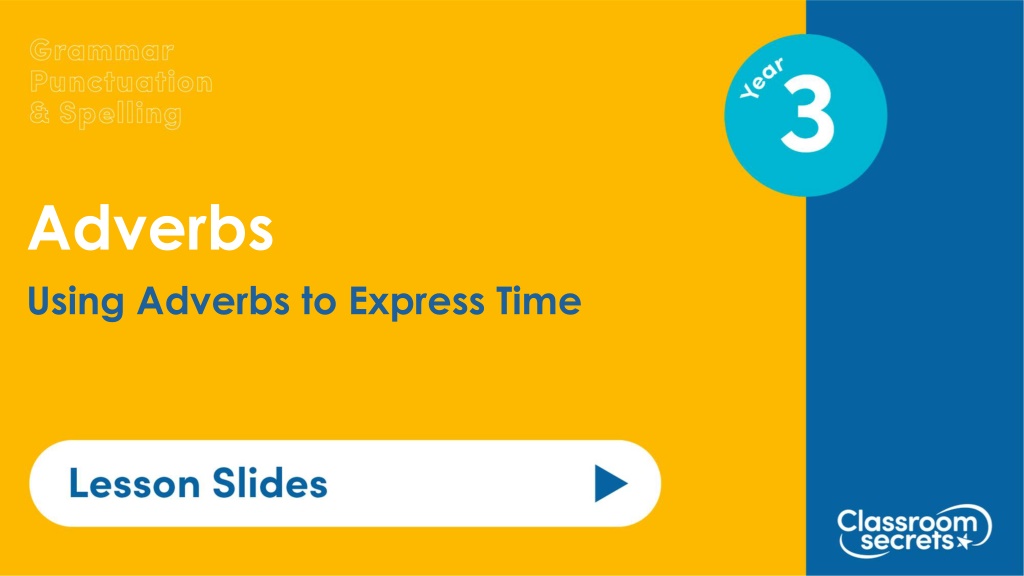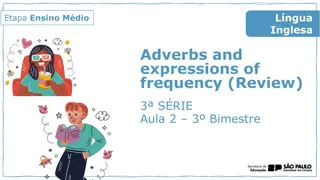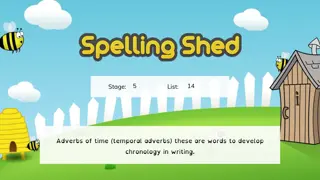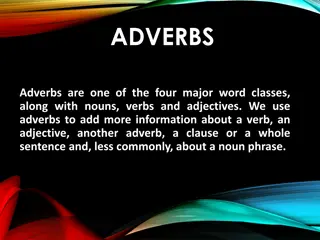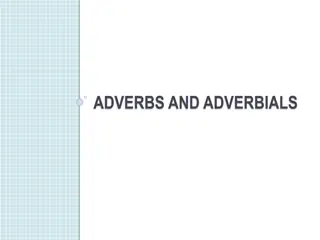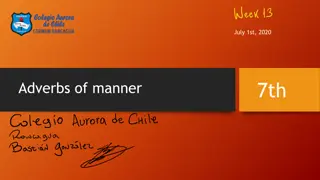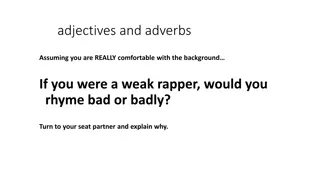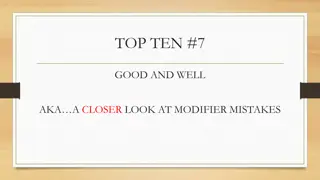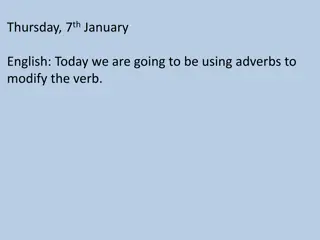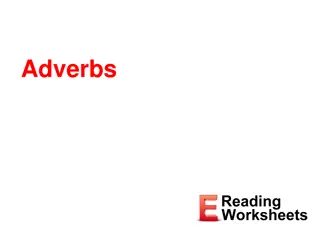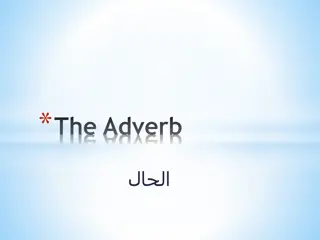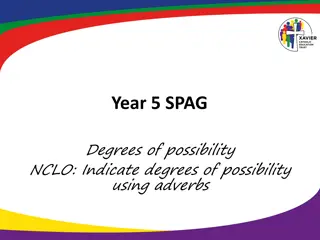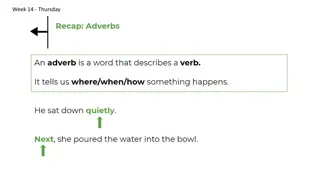Understanding Adverbs: Expressing Time in Language
Explore the role of adverbs in expressing time, differentiate between adverbs of manner and adverbs of time, and practice identifying and using adverbs in sentences. Learn how adverbs provide additional context to actions and discover examples of adverbs of time. Enhance your understanding of how adverbs interact with verbs to convey specific timeframes.
Download Presentation

Please find below an Image/Link to download the presentation.
The content on the website is provided AS IS for your information and personal use only. It may not be sold, licensed, or shared on other websites without obtaining consent from the author. Download presentation by click this link. If you encounter any issues during the download, it is possible that the publisher has removed the file from their server.
E N D
Presentation Transcript
Adverbs Using Adverbs to Express Time
Key Information A verb is a doing word. For example: jump, skip, shout An adverb is a word used to give extra information about how an action is carried out. For example: quickly, loudly, fast An adverb of time tells you when something happened. For example: yesterday, always, early
Lets start with a question about understanding what adverbs are, which is linked to the new learning later in this lesson.
Underline the adverbs in each sentence. Nathan laughed uncontrollably while he was listening to the podcast. Sophie s bed broke so she slept downstairs. We must leave now.
Underline the adverbs in each sentence. Nathan laughed uncontrollably while he was listening to the podcast. Sophie s bed broke so she slept downstairs. We must leave now.
Now that we are ready to move on, we can learn more about using adverbs to express time.
Previously, we have looked at adverbs of manner in detail. An adverb of manner is used to describe how a verb takes place. In this lesson we will be looking at adverbs of time. An adverb of time tell us when an action has or will happen. Examples of adverbs of time: yesterday today then soon now later next after before eventually immediately already
We can replace the adverb manner with an adverb of time in some sentences. Macey's brother crawled across the room quickly. Macey's brother crawled across the room yesterday. The first sentence uses the adverb of manner quickly . It tells us how Macey's brother crawled across the room. The second sentence is uses the adverb of time. It tells us when Macey s brother crawled.
Adverbs are dependant on the verb. Therefore, we must make sure they agree with the tense and still make sense. I climbed up the ladder to the loft yesterday. We know this sentence is written in the past tense because of the verb climbed . I climbed up the ladder to the loft soon. I climbed up the ladder to the loft now. I climbed up the ladder to the loft tomorrow. As the action has already happened, the adverb yesterday can be added successfully. However, the adverbs soon, now and tomorrow do not make sense as these are do not make sense in the past tense.
Create some of your own sentences with the adverbs below. today then soon immediately
We can create various sentences with the adverbs today, then, soon and immediately . We will be going to the theme park today. Can you mow the lawn then? The ice will melt soon. The man must be taken to a hospital immediately.
Use the word bank to complete the sentences below. Has the episode finished _______________? Nicola will get her law degree _______________. He booked his train ticket and left the day _______________. Word bank after already eventually
Use the word bank to complete the sentences below. Has the episode finished already? Nicola will get her law degree eventually. He booked his train ticket and left the day after. The sentences can be complete as shown above.
Which of these sentences uses the incorrect adverb? We ate breakfast earlier. Tomorrow we went to the park to feed the ducks. Logan was scheduled to see the doctor next. The tortoise crossed the finishing line soon. The hungry lions ate their food now.
Which of these sentences uses the incorrect adverb? We ate breakfast earlier. Tomorrow we went to the park to feed the ducks. Logan was scheduled to see the doctor next. The tortoise crossed the finishing line soon. The hungry lions ate their food now. These sentences have used the adverb incorrectly.
The placement of the adverb changes the importance and emphasis given to the verb. I have to take my final exam tomorrow. Tomorrow, I have to take my final exam. When the adverb is placed at the start of the sentence, it adds more importance and emphasis. When the adverb is placed at the end of the sentence, the importance or emphasis is not greater than when the adverb is placed at the start.
Complete the sentence with the most appropriate adverb. If we want to watch the movie on time, we must leave _______________. _______________, we are going to Andy s football match. I ve seen this magnificent sculpture _______________. today before now
Complete the sentence with the most appropriate adverb. If we want to watch the movie on time, we must leave now. Today, we are going to Andy s football match. I ve seen this magnificent sculpture before. today before now
In the sentence below, an adverb is used to emphasise when the verb takes place. True or false? We must leave before the security guard closes the gates.
In the sentence below, an adverb is used to emphasise when the verb takes place. True or false? We must leave before the security guard closes the gates. False because before is used as a conjunction. It is joining two clauses, not used as an adverb to express time.
Now that we understand how to use adverbs to express time, let s apply our learning to some further application and reasoning questions.
Mitchell has the sentence below. Cam reached his destination. I cannot add the adverb eventually at the start or end of the sentence because it won t make sense. Do you agree? Convince me.
Mitchell has the sentence below. Cam reached his destination. I cannot add the adverb eventually at the start or end of the sentence because it won t make sense. Do you agree? Convince me. I disagree because the adverb eventually could be added at the start, middle or end of the sentence and it would still make sense. Eventually, Cam reached his destination. , Cam eventually reached his destination. or Cam reached his destination eventually. clearly explain when Cam reached his destination.
Help Bozarko create two different sentences with the adverbs below. Use the adverbs you have chosen in a different positions in each sentence. soon later immediately then
Help Bozarko create two different sentences with the adverbs below. Use the adverbs you have chosen in a different positions in each sentence. soon later immediately then Various answers, for example: When the fire alarm started ringing, the white, fluffy cat jumped up immediately. Soon the large, noisy crowd must leave the venue.
Youre ready to progress! Now apply your learning by trying some questions.
Circle the adverbs of time. timidly defiantly recently rotate yesterday already Varied Fluency 1
Circle the adverbs of time. timidly defiantly recently rotate yesterday already Varied Fluency 1
Which adverb of time will complete the sentence below? Yesterday Already Lately ___________ , I helped my mum to clean the dirty dishes and then she read a story with me. Varied Fluency 2
Which adverb of time will complete the sentence below? Yesterday Already Lately Yesterday, I helped my mum to clean the dirty dishes and then she read a story with me. Varied Fluency 3
Tick the sentence that includes an adverb of time. A. Lately, the basketball team have won all their matches because they work together. B. Foolishly, Jess passed the ball to the opposition and they scored in the final minute. C. The girls ran wildly around the basketball court because they had won the cup. Varied Fluency 3
Tick the sentence that includes an adverb of time. A. Lately, the basketball team have won all their matches because they work together. B. Foolishly, Jess passed the ball to the opposition and they scored in the final minute. C. The girls ran wildly around the basketball court because they had won the cup. Varied Fluency 3
True or false? The following sentence includes an adverb of time. At the sound of the bell, everybody stopped playing immediately and went to line up. Varied Fluency 4
True or false? The following sentence includes an adverb of time. At the sound of the bell, everybody stopped playing immediately and went to line up. True Varied Fluency 4
Tick the boxes to show where the adverb, tomorrow, could best fit in the sentence below. Samuel will be travelling on a plane to go visit his grandparents in New Zealand. Prove it. Reasoning 1
Tick the boxes to show where the adverb, tomorrow, could best fit in the sentence below. Samuel will be travelling on a plane to go visit his grandparents in New Zealand. Prove it. Tomorrow can go in both places. Reasoning 1
Tick the boxes to show where the adverb, tomorrow, could best fit in the sentence below. Samuel will be travelling on a plane to go visit his grandparents in New Zealand. grandparents in New Zealand. Samuel will be travelling on a plane to go visit his Prove it. Tomorrow can go in both places. Tomorrow, Samuel will be travelling on a plane to go visit his grandparents in New Zealand. Samuel will be travelling on a plane to go visit his grandparents in New Zealand tomorrow. Reasoning 1
Kara has written a sentence including an adverb of time. Has she used the correct adverb of time? Immediately, Tom has not been scoring as many goals for his football team. Explain your answer. Reasoning 2
Kara has written a sentence including an adverb of time. Has she used the correct adverb of time? Immediately, Tom has not been scoring as many goals for his football team. Explain your answer. Kara is incorrect because Reasoning 2
Kara has written a sentence including an adverb of time. Has she used the correct adverb of time? Immediately, Tom has not been scoring as many goals for his football team. Explain your answer. Kara is incorrect because the sentence does not make sense. A better adverb would be recently. Application 1
Write two sentences using two of the adverbs below. eventually immediately recently Application 1
Write two sentences using two of the adverbs below. eventually immediately recently Various answers, for example: Recently, I have chosen to walk to school so I can be healthier. It was snowing outside, but I eventually got to school. Application 1
